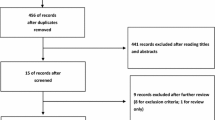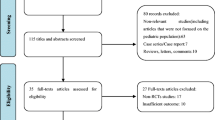Abstract
Introduction
Evidence regarding long-term oncological outcomes following conversion to open surgery (COS) during laparoscopic colorectal resection (LCR) is controversial. The aim of this study is to assess the impact on cancer recurrence of a failed laparoscopic attempt.
Methods
MEDLINE, Scopus and ISI Web of Knowledge databases were searched for articles reporting data on cancer recurrence in patients undergoing completed LCR and COS. Data were pooled by fixed or random effect modeling, according to the presence of heterogeneity. Primary outcomes were local recurrence (LR) and distance recurrence (DR).
Results
Seven studies involving 2493 patients (completed LCR, n 2201 and COS, n 292) were included. The pooled analysis showed that COS resections have an higher risk of LR (OR 1.97, 95% CI 1.14–3.42, p = 0.1); no difference was found in DR (OR 1.09, 95% CI 0.67–1.77, p = 0.71). However, an higher rate of T4 tumor was present in the converted group (OR 2.62, 95% CI 1.71–4, p = 0.0). Subgroup analysis including studies with T stage matched populations showed no significant statistical difference in LR rate; however, a trend toward higher recurrence was still clear.
Conclusion
There is no consistent evidence that a failed laparoscopic attempt does not result in a poorer oncological outcome; therefore, a careful selection of patients for LCR for cancer is required.



Similar content being viewed by others
Abbreviations
- COS:
-
Conversion to open surgery
- LCR:
-
Laparoscopic colorectal resection
- LR:
-
Local recurrence
- DR:
-
Distance recurrence
- RCTs:
-
Randomized controlled trials
- LCO:
-
Laparoscopic completed operations
- NOS:
-
Newcaste–Ottawa Scale
References
Gervaz P, Pikarsky A, Utech M et al (2001) Converted laparoscopic colorectal surgery. Surg Endosc 15:827–832. doi:10.1007/s004640080062
Schwandner O, Schiedeck TH, Bruch H (1999) The role of conversion in laparoscopic colorectal surgery: Do predictive factors exist? Surg Endosc 13:151–156
Giglio MC, Celentano V, Tarquini R et al (2015) Conversion during laparoscopic colorectal resections: a complication or a drawback? A systematic review and meta-analysis of short-term outcomes. Int J Colorectal Dis 11:1445–1455. doi:10.1007/s00384-015-2324-5
Guillou PJ, Quirke P, Thorpe H et al (2005) Short-term endpoints of conventional versus laparoscopic-assisted surgery in patients with colorectal cancer (MRC CLASICC trial): multicentre, randomised controlled trial. Lancet 365:1718–1726. doi: 10.1016/S0140-6736(05)66545-2
Neudecker J, Klein F, Bittner R et al (2009) Short-term outcomes from a prospective randomized trial comparing laparoscopic and open surgery for colorectal cancer. Br J Surg 96:1458–1467. doi:10.1002/bjs.6782
Veldkamp R, Kuhry E, Hop WCJ et al (2005) Laparoscopic surgery versus open surgery for colon cancer: short-term outcomes of a randomised trial. Lancet Oncol 6:477–484. doi:10.1016/S1470-2045(05)70221-7
van der Pas MH, Haglind E, Cuesta MA et al (2013) Laparoscopic versus open surgery for rectal cancer (COLOR II): short-term outcomes of a randomised, phase 3 trial. Lancet Oncol 14:210–218. doi:10.1016/S1470-2045(13)70016-0
West NP, Kennedy RH, Magro T et al (2014) Morphometric analysis and lymph node yield in laparoscopic complete mesocolic excision performed by supervised trainees. Br J Surg 101:1460–1467. doi:10.1002/bjs.9602
Yamamoto S, Fukunaga M, Miyajima N et al (2009) Impact of conversion on surgical outcomes after laparoscopic operation for rectal carcinoma: a retrospective study of 1,073 patients. J Am Coll Surg 208:383–389. doi:10.1016/j.jamcollsurg.2008.12.002
Marusch F, Gastinger I, Schneider C et al (2001) Importance of conversion for results obtained with laparoscopic colorectal surgery. Dis Colon Rectum 44:207–214 (discussion 214-216)
Moloo H, Mamazza J, Poulin EC et al (2004) Laparoscopic resections for colorectal cancer: Does conversion survival? Surg Endosc 18:732–735. doi:10.1007/s00464-003-8923-1
Scheidbach H, Garlipp B, Oberländer H et al (2011) Conversion in laparoscopic colorectal cancer surgery: impact on short- and long-term outcome. J Laparoendosc Adv Surg Tech A 21:923–927. doi:10.1089/lap.2011.0298
Biondi A, Grosso G (2014) Predictors of conversion in laparoscopic-assisted colectomy for colorectal cancer and clinical outcomes. Surg Laparosc 24:21–26
Jayne DG, Thorpe HC, Copeland J et al (2010) Five-year follow-up of the Medical Research Council CLASICC trial of laparoscopically assisted versus open surgery for colorectal cancer. Br J Surg 97:1638–1645. doi:10.1002/bjs.7160
Allaix ME, Degiuli M, Arezzo A et al (2013) Does conversion affect short-term and oncologic outcomes after laparoscopy for colorectal cancer? Surg Endosc 27:4596–4607. doi:10.1007/s00464-013-3072-7
Ptok H, Kube R, Schmidt U et al (2009) Conversion from laparoscopic to open colonic cancer resection—associated factors and their influence on long-term oncological outcome. Eur J Surg Oncol 35:1273–1279. doi:10.1016/j.ejso.2009.06.006
Rottoli M, Bona S, Rosati R et al (2009) Laparoscopic rectal resection for cancer: effects of conversion on short-term outcome and survival. Ann Surg Oncol 16:1279–1286. doi:10.1245/s10434-009-0398-4
White I, Greenberg R, Itah R et al (2011) Impact of conversion on short and long-term outcome in laparoscopic resection of curable colorectal cancer. JSLS 15:182–187. doi:10.4293/108680811X13071180406439
Chan ACY, Poon JTC, Fan JKM et al (2008) Impact of conversion on the long-term outcome in laparoscopic resection of colorectal cancer. Surg Endosc 22:2625–2630. doi:10.1007/s00464-008-9813-3
Wells GA, Shea B, O’Connell D et al (2011) The Newcastle-Ottawa Scale (NOS) for assessing the quality if nonrandomized studies in meta-analyses. Department of Epidemiology and Community Medicine, University of Ottawa, Ottawa, Canada
Higgins JPT, Thompson SG, Deeks JJ et al (2003) Measuring inconsistency in meta-analyses. BMJ 327:557–560. doi:10.1136/bmj.327.7414.557
Stroup DF, Berlin JA, Morton SC et al (2000) Meta-analysis of observational studies in epidemiology: a proposal for reporting. Meta-analysis Of Observational Studies in Epidemiology (MOOSE) group. JAMA 283:2008–2012
Keller DS, Khorgami Z, Swendseid B et al (2014) Laparoscopic and converted approaches to rectal cancer resection have superior long-term outcomes: a comparative study by operative approach. Surg Endosc 28:1940–1948. doi:10.1007/s00464-014-3419-8
Laurent C, Leblanc F, Wütrich P et al (2009) Laparoscopic versus open surgery for rectal cancer: long-term oncologic results. Ann Surg 250:54–61. doi:10.1097/SLA.0b013e3181ad6511
Martinek L, Dostalik J, Gunkova P et al (2012) Impact of conversion on outcome in laparoscopic colorectal cancer surgery. Videosurgery Other Miniinvasive Tech 7:74–81. doi:10.5114/wiitm.2011.25799
Rottoli M, Stocchi L, Geisler DP et al (2012) Laparoscopic colorectal resection for cancer: effects of conversion on long-term oncologic outcomes. Surg Endosc 26:1971–1976. doi:10.1007/s00464-011-2137-8
Strohlein MA, Grutzner KU, Jauch KW et al (2008) Comparison of laparoscopic vs. open access surgery in patients with rectal cancer: a prospective analysis. Dis Colon Rectum 51:385–391. doi:10.1007/s10350-007-9178-z
Giglio MC, Persico M, Quarto G et al (2013) Intersphinteric resection for rectal cancer: role in fecal continence and Quality of Life. Ann Ital Chir 84:287–290
Luglio G, Masone S, Quarto G et al (2013) Functional results after TME: J-pouch vs straight coloanal anastomosis and role of neoadjuvant radiochemotherapy. Ann Ital Chir 84:571–574
De Palma GD, Luglio G (2015) Quality of life in rectal cancer surgery: What do the patient ask? World J Gastrointest Surg 7:349–355
West NP et al (2014) Morphometric analysis and lymph node yield in laparoscopic complete mesocolic excision performed by supervised trainees. Br J Surg 101:1460–1467
Milone M et al (2015) Intracorporeal versus extracorporeal anastomosis. Results from a multicentre comparative study on 512 right-sided colorectal cancers. Surg Endosc 29:2314–2320
Luglio G et al (2015) Laparoscopic colorectal surgery in learning curve: role of implementation of a standardized technique and recovery protocol. A cohort study. Ann Med Surg 4:89–94
Luglio G, Nelson H (2010) Laparoscopy for colon cancer: state of the art. Surg Oncol Clin N Am 19:777–791
Caputo D, Caricato M, La Vaccara V et al (2014) Conversion in mini-invasive colorectal surgery: the effect of timing on short term outcome. Int J Surg 12:805–809. doi:10.1016/j.ijsu.2014.06.010
Funding
The authors declare that they have received no funding for the study.
Author information
Authors and Affiliations
Corresponding author
Ethics declarations
Conflict of interest
The authors declare that they have no conflict of interest.
Ethical approval
For this type of study, formal consent is not required.
Human and animal rights
The procedures followed were in accordance with the ethical standards of the responsible committee on human experimentation (institutional and national) and with the Helsinki Declaration of 1975, as revised in 2000 and 2008.
Informed consent
This type of study is based on aggregated data of already published studies. Informed consent can not be obtained from patients.
Rights and permissions
About this article
Cite this article
Giglio, M.C., Luglio, G., Sollazzo, V. et al. Cancer recurrence following conversion during laparoscopic colorectal resections: a meta-analysis. Aging Clin Exp Res 29 (Suppl 1), 115–120 (2017). https://doi.org/10.1007/s40520-016-0674-7
Received:
Accepted:
Published:
Issue Date:
DOI: https://doi.org/10.1007/s40520-016-0674-7




